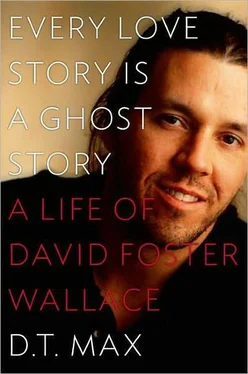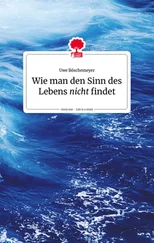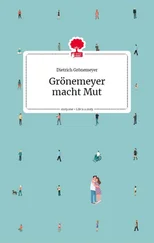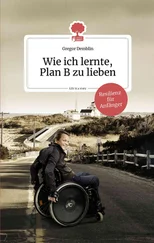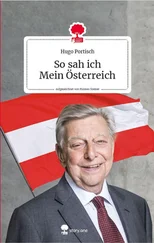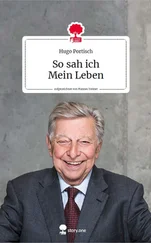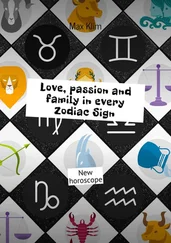By the spring of 1992, Karr’s marriage was finally at an end and Wallace had new hope he could be at her side. He was ecstatic. He was ready to leave Boston. He had come to hate “this soot-fest city,” as he called it to Morrow. And he was sick of teaching. If he could get an advance, he could have the life and the woman he wanted. He had suffered beyond what he knew possible for her, and the suffering felt like an act of absolution.
In April, just before sending in the manuscript pages for Nadell and Howard, Wallace took the train down to Swarthmore College, outside of Philadelphia. Franzen was teaching a class there and had invited him to judge a fiction competition. Wallace also read from Infinite Jest . Playing to his young audience, he chose a section about Don Gately that predates his admission to Ennet House. In the segment, the young addict and a partner break into a local assistant district attorney’s house, take pictures of themselves with toothbrushes up their anuses, and send the pictures to him. Beforehand, Wallace asked for a chalkboard and wrote down words and abbreviations that might not be familiar to the students. Infinite Jest was filled with the languages Wallace had learned in Boston — from drug addict lingo to Alcoholics Anonymous slogans. One word that Wallace had recently learned was “shunt”—to disarm an alarm system by creating a new circuit for the electricity. Wallace had gotten the word in an interview with a retired burglary detective whom Mark Costello had met working as an assistant district attorney. Wallace had listened for an hour, overwhelmed by the fact-heavy conversation. When Costello looked, “shunt” was the only word he had written in his notebook. 23
At Swarthmore, Wallace stayed with Franzen, who remembers “an endearingly eccentric figure,” a tobacco chewer with a love of showering, Diet Dr Pepper, and blondies. They hardly knew each other, despite having become, as Wallace would later put it in a letter to his friend, the “best of pals and lit combatants.” Wallace was urging Franzen and his then wife to join him and Karr in Syracuse, and after the reading the two young men headed north in Franzen’s old Saab to check out the city, Wallace upset he had left his favorite scarf, in the colors of the family tartan, behind. 24They took turns driving, the weather was bad, and Franzen was amazed at how much wiper fluid his friend used.
When they got to Syracuse, Wallace was surprised to find himself relegated to Karr’s floor for the night alongside Franzen. She appeared not to have the same expectations for his visit that he had. And when Wallace, Franzen, and Karr drove through the town, she asked him to crouch down out of view — apparently she was worried that news of his arrival would reach her husband, who was still nearby. Wallace and Franzen drove back down to Swarthmore the next day, discussing the purpose of literature nearly the whole way. Wallace argued that it was to alleviate loneliness and give comfort, to break through what he characterized in Infinite Jest as each person’s “excluded encagement in the self.” He wanted Franzen to know that he had become a different person and a different writer in the four years they’d known each other. After he got home, he wrote Franzen that their chat had been “among the most nourishing for me in recent memory” and suggested that his friend read Brian Moore’s Catholics , a story of a man who pledges everything for his faith. Franzen read the book and was unimpressed — his disciple had surpassed him in his quest for sincerity — but then Wallace rarely did things by halves.
A month later, in May 1992, Wallace packed up what little he had and drove to Syracuse. He had rented a first-floor apartment in a house around the corner from Karr and a few blocks from the main campus. It was in a typical graduate-student neighborhood, full of warping clapboard houses and semi-kempt lawns and right across from the food co-op. But being near the woman he loved made all the difference. “Syracuse,” he wrote Debra Spark later in the month, “is very cheap (not to mention lovely to live in, with grass and trees and terrific parks and absurdly little traffic and M. Karr).” Costello came up and brought Wallace’s old college computer. Wallace, he saw, was scribbling eagerly in his spiral-bound book whenever he had a moment. They went with Karr and her son for a tour of the hippie thrift shops in the tiny towns of Onondaga County. Costello bought a leather jacket, and the couple teased him. He also noticed that Wallace and Karr behaved like friends rather than lovers, probably because Karr wanted things to look ambiguous to her son or maybe because they were still ambiguous. “He really could have been her gay friend, from body language,” Costello remembered.
To Costello’s eyes, Karr seemed like a tougher version of Gale Walden. She had his friend’s number. When she would tease him about his work he would put up with it, to his old roommate’s surprise. He also saw how much Wallace liked being with Dev, Karr’s young son. Wallace told the boy there were talking spiders in his beard and, when Dev asked, explained that the purpose of his bandana was to keep his head from exploding. Children had a quality Wallace would increasingly crave in those around him: they were drawn to him without crowding him. They were part of that group of people — students, recovery friends, ordinary people unconnected to the fiction business — whom he admitted to his circle because they left him room. Such people, he wrote to Franzen, “make me feel both unalone and unstressed.” 25Costello spent the weekend nights of his visit on chair cushions in his friend’s tiny apartment, Wallace in the bed. He explained that he was banned from sleeping at Karr’s while Dev was there.
With Karr still not quite available, Wallace made do as best he could. He lived on chocolate Pop-Tarts and soda, too poor to eat properly. Getting fed was a priority. So when he met Stephanie Hubbard and Doug Eich, a couple in the orbit of the recovery group he had just joined, his interest was both literary and culinary. He would go to Hubbard’s house, where she would cook and he and Eich discussed language and fiction. Eich misused nauseous for nauseated and Wallace corrected him, adducing his mother. Eich, a graduate student in linguistics, called his new friend “a smug prescriptivist douche-bag.” Wallace was chewing tobacco again, which he would spit into a soda can, apologizing profusely to Hubbard and Eich while enjoying their attention. Then he would take a toothbrush he kept in a Ziploc bag in his sock and brush his teeth in their bathroom. The three would discuss the day’s recovery meetings. Eich and Wallace shared a passion for DeLillo and also Cormac McCarthy. Wallace had discovered McCarthy late, when he was teaching at Amherst. “Something like Faulkner on acid,” he had written Richard Elman at the time, in excitement. Eich and Wallace agreed that the gritty portrait of the alcoholic in Suttree was far more interesting than the self-pitying Consul in Lowry’s Under the Volcano . 26
The three would talk for hours. The conversation often turned to faith. Wallace said he was trying to pray, because, even though he did not necessarily believe in God, it seemed like a good thing to do. Karr had become attracted to Catholicism — for her baptism would be a key moment in her recovery from alcohol. So for a time Wallace too hoped to receive the sacraments, thinking that if he and Karr were to marry they could have a religious wedding. (Ultimately the priest told him he had too many questions to be a believer, and he let the issue drop.) Wallace’s real religion was always language anyway. It alone could shape and hold multitudes; by comparison God’s power was spindly. That was why he was obsessed with grammar; as he put it in a letter to Franzen, “If words are all we have as world and god, we must treat them with care and rigor: we must worship.”
Читать дальше
